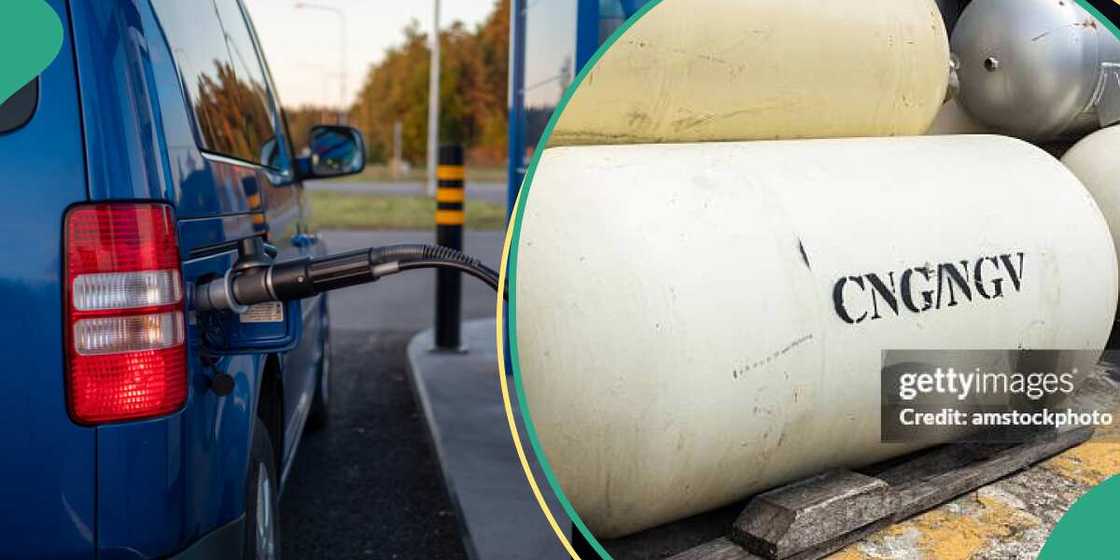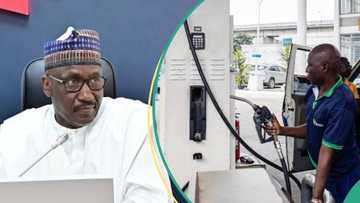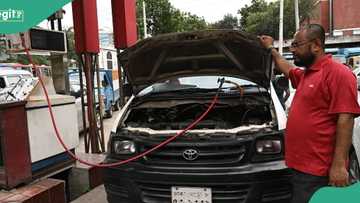N3,600 Per 250 Kilometre: FG Opens Another Location to Buy Cheap Fuel
- The federal government and other parties have opened a CNG reverse-engineering, training, filling, and conversion centre in Abuja
- The CEO of Portland Gas Limited praised the president for his idea to diversify the country's energy sources in an attempt to bring down the cost of transportation
- He also revealed that the company was working with Kia to promote the adoption of CNG vehicles in Nigeria by developing and distributing CNG hybrid models
PAY ATTENTION: Legit.ng Entertainment Awards 2024 Voting Is Alive. Choose the best entertainer in 15 categories for FREE.
Legit.ng journalist Zainab Iwayemi has over 3-year-experience covering the Economy, Technology, and Capital Market.
In conjunction with the federal government, the National Agency for Science and Engineering Infrastructure (NASENI), along with Portland Gas Limited, opened a Compressed Natural Gas (CNG) reverse-engineering, training, filling, and conversation centre in Abuja on Friday, May 31.

Source: Getty Images
Portland Gas Limited CEO Folajimi Mohammed noted that Nigeria's efforts to support natural gas initiatives had advanced significantly with the NASENI-Portland cooperation.

Read also
NNPC releases location, details of new filling station to buy fuel priced at N200, makes promises
He explained in an Arise News report that CNG provides an environmentally friendly and commercially feasible substitute for conventional petroleum products.
PAY ATTENTION: Click “See First” under the “Following” tab to see Legit.ng News on your Facebook News Feed!
The CEO explained that the collaboration implies that the public and private sectors could pool knowledge, ingenuity, and inventiveness.
According to Mohammed, President Bola Tinubu's recent inauguration of three new upstream gas facilities is a game changer. He also hailed the president for his vision to diversify the nation's energy sources in an effort to lower transportation costs.
In addition, he emphasized the president's dedication to advancing economic expansion, inclusivity, and the creation of a tranquil atmosphere that supports the success of companies.
Why CNG is more economical
In addition to teaching engineers and technicians, he said that the centers would provide advanced training in CNG technology.
Mohammed claimed that the president's audacious decision to withdraw fuel subsidies offered a chance to switch to compressed natural gas, which is more economical and less harmful to the environment.
“On average, a petrol vehicle consumes about 60 litres of Premium Motor Spirit (PMS) to travel 250 kilometres, costing approximately N37,020, given current fuel prices. In contrast, a CNG vehicle requires about 18 standard cubic meters (scm) of gas for the same distance, costing around N3,600.
“For a 250 km drive, this translates to a significant cost saving, highlighting the economic benefits of CNG over PMS. CNG and hybrid vehicles offer better efficiency and lower emissions, and by embracing CNG, we not only reduce our transportation costs but also contribute to a cleaner environment,” he added.
Mohammed also provided further details about the company's collaboration with KIA, stating that the goal of the cooperation is to create and market CNG hybrid cars in order to encourage the use of CNG vehicles in Nigeria.
“This initiative will ensure that Nigerians have access to affordable, efficient, and environmentally friendly transportation options making it easier for Nigerians to transition to this cleaner energy alternative,” Mohammed said.
Iniform Asifa told Legit.ng that the development would help to ease the burden of Nigerians.
She said,
"If the CNG comes at a cheaper cost compared to the petrol we use, then it means things are going to become better. This is because cheaper fuel means affordable transportation and cost of living which could impact inflation."

Read also
“The facility is ready”: NNPC opens new filling station for Nigerians to buy fuel priced at N200
FG deploys CNG-buses
Legit.ng reported that the Federal Government has started deploying compressed natural gas-powered buses and tricycles, with a base of operations in Ilorin, the capital of Kwara State.
Approximately 2,700 buses and tricycles powered by compressed natural gas (CNG) will be introduced, according to a statement made by President Bola Tinubu earlier.
Before the end of 2024, the federal government plans to set up 60 refuelling locations and 100 conversion workshops spread over 18 states.
Proofreading by Nkem Ikeke, journalist and copy editor at Legit.ng.
PAY ATTENTION: Stay Informed and follow us on Google News!
Source: Legit.ng


